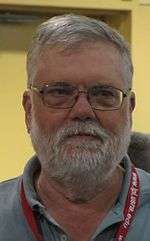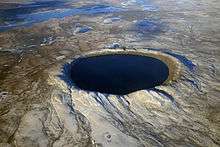H. Jay Melosh
H. Jay Melosh (born June 23, 1947) is an American geophysicist specialising in impact cratering. He earned a degree in physics from Princeton University and a doctoral degree in physics and geology from Caltech in 1972.[1] Melosh's research interests include impact craters, planetary tectonics, and the physics of earthquakes and landslides. His recent research includes studies of the giant impact origin of the moon, the Chicxulub impact that is thought to have extinguished most dinosaurs, and studies of ejection of rocks from their parent bodies. He is active in astrobiological studies that relate chiefly to the exchange of microorganisms between the terrestrial planets (a process known as panspermia or transpermia[2]).
H. Jay Melosh | |
|---|---|
 | |
| Born | June 23, 1947 |
| Citizenship | United States |
| Education | Princeton Caltech |
| Known for | Impact Cratering Studies |
| Awards | Barringer Medal G K Gilbert Award |
| Scientific career | |
| Fields | Geophysics |
| Institutions | Purdue University |
| Website | eaps.purdue.edu/people/faculty-pages |
Melosh is a member of the American Geophysical Union, Geological Society of America, Meteoritical Society, American Astronomical Society (Division of Planetary Sciences,) and the American Association for the Advancement of Science.[1] He is the recipient of the Barringer Medal of the Meteoritical Society for his work on the physics of impact, and of the G. K. Gilbert Award from the Geological Society of America. He was elected to the National Academy of Sciences in 2003.[3]
Awards and honors
- Asteroid 8216 Melosh is named in his honor.
- The American Geophysical Union 2008 Harry H. Hess Medal - for “outstanding achievements in research in the constitution and evolution of Earth and sister planets.”[4]
Publications
- Impact Cratering: A Geologic Process, Oxford University Press, 1989, (ISBN 0-19-510463-3)[5]
External links
References
- "Curriculum Vitae" (PDF). Purdue University. Retrieved June 24, 2016.
- "Swapping Rocks - Exchange of Surface Material Among the Planets". Australian Spaceguard Survey. Retrieved June 23, 2016.
- U A News Archived 2006-02-13 at the Wayback Machine
- "2008 Harry H. Hess Medal Winner". American Geophysical Union. Retrieved June 23, 2016.
- Melosh, H. J. (1989). "Abstract". Research supported by NASA. New York. Harvard-Smithsonian Center for Astrophysics. Bibcode:1989icgp.book.....M.

